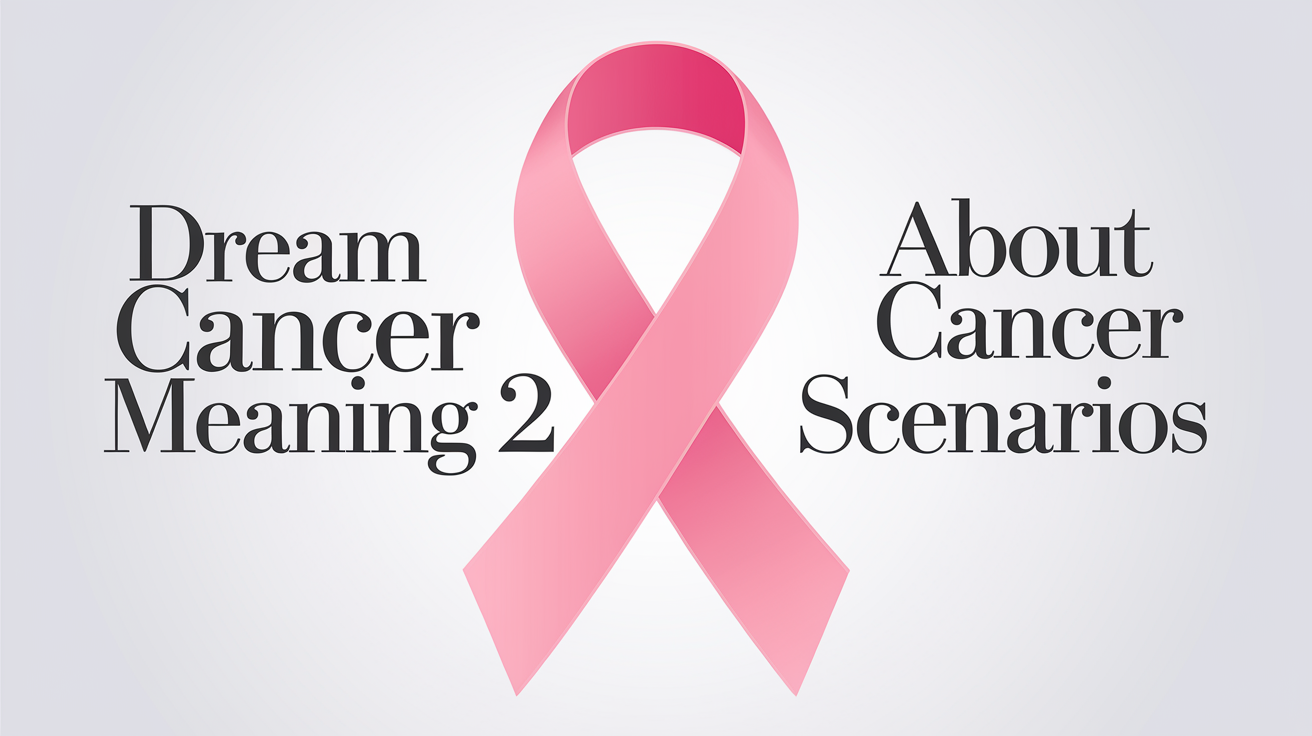Dreams about cancer can be distressing and perplexing, often leaving you to ponder their deeper meanings.
This comprehensive guide explores various interpretations of cancer-related dreams, delving into psychological, cultural, and symbolic insights to help you better understand what these dreams might signify.
The Symbolism of Cancer Dreams
Cancer dreams often carry rich symbolism, reflecting various aspects of our subconscious mind. Here’s a deeper look at what cancer dreams might symbolize:
Fear and Anxiety
Cancer, as a symbol in dreams, frequently represents deep-seated fears and anxieties. The illness’s association with serious health issues can mirror personal fears about health, mortality, or the unknown. If you’re experiencing stress or anxiety in your waking life, it might manifest as cancer in your dreams.
For example, if you’re worried about a health issue, dreaming about cancer could be your mind’s way of expressing those concerns. It might be a reflection of your anxieties about potential health problems or fears of facing a serious illness.
Transformation and Change
Cancer can also symbolize transformation and change. Just as cancer involves a dramatic shift in physical health, dreams about cancer might indicate significant changes or transformations in your life. This could be related to personal growth, a major life decision, or the end of one phase and the beginning of another.
Consider this: If you’re undergoing a significant life transition, such as starting a new job or ending a relationship, you might dream about cancer as a metaphor for the emotional upheaval and transformation you’re experiencing.
Loss of Control
Dreams featuring cancer often represent a loss of control. Cancer is a disease that disrupts the body’s normal functions, and similarly, cancer dreams might symbolize situations where you feel powerless or out of control in your waking life.
For instance, if you’re dealing with a situation that seems to be spiraling out of control, like a challenging project at work or a difficult relationship, dreaming about cancer might reflect your feelings of helplessness and lack of control.
Inner Conflict
Cancer in dreams can also signify inner conflict or unresolved emotional issues. The disease’s destructive nature can be a metaphor for internal struggles or emotional turmoil.
If you’re experiencing unresolved conflicts or negative emotions, these might manifest as cancer in your dreams. It could be your mind’s way of highlighting these issues and urging you to address them.
Psychological Interpretation
Psychologists often view cancer dreams as a reflection of subconscious fears and stressors. According to Dr. Mark M. Leary, a professor of psychology, such dreams might serve as an outlet for repressed anxieties or fears. They can be a way for your subconscious mind to process and confront deep-seated concerns that you may not be fully aware of in your waking life.
Possible Causes of Cancer Dreams

Understanding the causes behind cancer dreams can provide insights into their meanings. Here are some common triggers:
Stress and Anxiety
High levels of stress and anxiety are common causes of cancer dreams. Stressful situations, whether related to work, relationships, or personal issues, can cause your mind to manifest these anxieties in the form of cancer dreams.
Tips to manage stress:
- Practice mindfulness and meditation.
- Engage in regular physical exercise.
- Establish a healthy work-life balance.
Negative Thinking Patterns
Negative thinking patterns can also contribute to cancer dreams. If you tend to focus on worst-case scenarios or engage in self-critical thoughts, these can influence your dreams and make you more likely to experience distressing visions like cancer.
Ways to counter negative thinking:
- Challenge and reframe negative thoughts.
- Seek cognitive-behavioral therapy (CBT) techniques.
- Surround yourself with supportive people.
Health Concerns
Concerns about health, whether real or perceived, can trigger cancer dreams. If you’re worried about your own health or the health of loved ones, these concerns might manifest in your dreams as cancer-related scenarios.
To address health concerns:
- Schedule regular health check-ups.
- Educate yourself about health and wellness.
- Talk to a healthcare professional if you have persistent worries.
Subconscious Worries
Subconscious worries about yourself or others can also lead to cancer dreams. These dreams might be a manifestation of deeper fears or anxieties that you haven’t fully acknowledged in your waking life.
How to address subconscious worries:
- Keep a dream journal to track recurring themes.
- Explore underlying fears with a therapist.
- Practice self-reflection and personal growth techniques.
Cultural and Religious Interpretations
The interpretation of cancer dreams can vary widely across different cultures and religions. Here’s how various traditions view these dreams:
Biblical Meaning of Cancer in Dreams
In biblical contexts, cancer dreams can be interpreted in several ways:
- Sin and Punishment: Some biblical interpretations view cancer as a symbol of sin or moral failings. This perspective suggests that the dream might reflect feelings of guilt or the need for repentance.
- Faith and Healing: Dreams about cancer might also symbolize a need for spiritual healing. This interpretation suggests that the dream is an indication of seeking divine intervention or spiritual support.
- Symbol of Trials: Cancer in dreams can be seen as a test of faith or a representation of life’s trials. This view suggests that the dream may symbolize challenges or hardships that you are facing or will face.
Other Cultural Views
Different cultures have their own interpretations of cancer in dreams:
- Eastern Cultures: In many Eastern cultures, cancer dreams might be seen as a sign of imbalanced energy or unresolved issues. These interpretations often focus on the need for holistic healing and balance.
- Western Cultures: In Western contexts, cancer dreams are commonly viewed through a psychological lens, focusing on anxiety and emotional distress. The emphasis is often on addressing these emotional issues and seeking psychological support.
Is It Lucky or Unlucky to Dream of Cancer?

The perception of cancer dreams as lucky or unlucky varies:
Superstitions and Beliefs
Many superstitions view cancer dreams as unlucky or ominous. These beliefs often stem from the disease’s serious nature and the fear it evokes.
Positive Interpretations
Despite common beliefs, some interpretations suggest that cancer dreams can have positive aspects. For example:
- Overcoming Adversity: Dreams about cancer can symbolize overcoming significant challenges or personal growth.
- New Beginnings: Cancer dreams might signify the end of one phase of life and the beginning of another, representing renewal and transformation.
Negative Connotations
On the flip side, cancer dreams are frequently viewed as negative or alarming. They are often associated with fears of illness, loss, or significant life disruptions.
Common Cancer Dreams and Their Interpretations
Let’s explore some specific cancer dream scenarios and what they might mean:
Dream About Having Cancer
Dreaming about having cancer often reflects personal health anxieties or fears about your well-being. It might indicate a need to address these fears or a call to pay attention to your health.
Interpretation Tips:
- Reflect on any current health concerns or stressors.
- Consider if the dream is a manifestation of your anxieties or a prompt to seek medical advice.
Dream About Being Diagnosed With Cancer
This type of dream typically symbolizes fear of receiving bad news or a sense of impending crisis. It might also represent anxieties about life-altering situations.
Interpretation Tips:
- Examine your fears about receiving negative information.
- Assess if you’re facing any significant decisions or changes in your life.
Dream About Different Types of Cancer
Dreaming about various types of cancer can represent different personal fears or issues. Each type of cancer might symbolize a specific area of anxiety or concern in your life.
Interpretation Tips:
- Identify the type of cancer and its association with your fears.
- Reflect on how these types relate to specific aspects of your life or health.
Dream About Someone Else Having Cancer
When you dream about someone else having cancer, it often reflects concern and empathy. It might indicate worries about the well-being of loved ones or feelings of helplessness regarding their situations.
Interpretation Tips:
- Consider your relationship with the person in the dream.
- Reflect on your feelings of concern or inability to support them.
Dream About Family Member Having Cancer
Dreaming about a family member having cancer can signify concerns about family dynamics or personal fears about family health. It might also reflect unresolved issues within the family.
Interpretation Tips:
- Assess your relationship with the family member.
- Reflect on any family health concerns or unresolved conflicts.
Dream About Boyfriend/Girlfriend Having Cancer
Dreams about a partner having cancer often represent relationship concerns or fears about losing your significant other. It might also reflect anxieties about the stability of the relationship.
Interpretation Tips:
- Evaluate the state of your relationship and any underlying fears.
- Consider if the dream reflects insecurities or concerns about the future of the relationship.
Dream About Dying of Cancer
Dreaming about dying of cancer can be particularly distressing, but it often symbolizes significant life changes or the end of a phase. It might also reflect existential fears or a need for transformation.
Interpretation Tips:
- Reflect on major changes or transitions in your life.
- Consider if the dream signifies a need for personal growth or a new beginning.
Dealing with Cancer Dreams
Here’s how to approach and manage cancer dreams effectively:
Understanding and Processing
- Analyze the Dream: Reflect on the specific details of the dream and what they might reveal about your fears or concerns.
- Seek Insight: Consider talking to a therapist or counselor to gain a deeper understanding of recurring cancer dreams.
Health Check
- Regular Check-Ups: Ensure you’re up-to-date with your health check-ups and address any genuine health concerns.
- Educate Yourself: Stay informed about health and wellness to alleviate unnecessary fears.
Emotional and Mental Health
- Address Underlying Issues: Work on resolving emotional or psychological issues that might be contributing to cancer dreams.
- Practice Self-Care: Engage in activities that support your emotional well-being and reduce stress.
Seeking Professional Help
- Therapy and Counseling: If cancer dreams are frequent or particularly distressing, consider seeking help from a mental health professional.
- Support Groups: Join support groups or communities where you can share your experiences and gain support from others facing similar issues.
Conclusion
Cancer dreams can be unsettling, but understanding their meanings can provide valuable insights into your subconscious mind. By reflecting on the symbolism and possible causes of these dreams, you can gain a deeper understanding of your fears, anxieties, and emotional state.
Remember, dreams about cancer do not necessarily predict the future or reflect reality. They are often a manifestation of your inner concerns and emotional state. By addressing these underlying issues and seeking appropriate support, you can navigate these dreams with greater clarity and peace of mind.
Feel free to share your experiences or seek further insights if cancer dreams continue to trouble you. Understanding and addressing the deeper meanings behind these dreams can lead to personal growth and emotional well-being.


